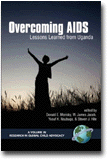
Overcoming AIDS
Lessons Learned from Uganda
Edited by:
Donald E. Morisky, University of California, Los Angeles
W. James Jacob, University of California, Los Angeles
Yusuf K. Nsubuga, Uganda Ministry of Education and Sports
Steven J. Hite, Brigham Young University
A volume in the series: Research in Global Child Advocacy. Editor(s): Ilene R. Berson, University of South Florida. Michael J. Berson, University of South Florida.
Published 2006
As a result of the AIDS epidemic, many nations around the world have faced the demands of caring for a particularly vulnerable population of children, the orphans of parents who have died of AIDS or whose caregivers are terminally ill from the disease. Overcoming AIDS: Lessons Learned from Uganda offers an in-depth exploration of this global issue and provides a broad focus on evolving a constructive response to the HIV/AIDS epidemic.
This collaborative resource is the fourth in the Research in Global Child Advocacy book series, and it offers readers a glimpse into the experience of HIV/AIDS infected and affected people from the perspective of researchers, policy makers, and professionals who diligently work toward crafting a framework for action that is integrated across disciplines. Despite the enormity and intensity of the problem, chapter authors share a commitment to advocate for a better world in which social and economic disparities do not preclude children from experiencing a future that is bright with potential opportunities and hope.
CONTENTS
Foreword. Introduction, Donald E. Morisky, W. James Jacob, Yusuf K. Nsubuga, and Steven J. Hite. Part I: Setting the Contextual Stage of HIV/AIDS in Uganda. A Multisectoral Strategy for Overcoming AIDS in Uganda, Yusuf K. Nsubuga and W. James Jacob. Fighting Stigma and Discrimination
as a Strategy for HIV/AIDS Prevention and Control, Yusuf K. Nsubuga and W. James Jacob. Part II: HIV/AIDS Education Programs in the Formal Education Sector. Evaluation of HIV/AIDS Education Programs in Uganda. W. James Jacob, Donald E. Morisky, Steven J. Hite, and Yusuf K. Nsubuga. Preparing a Generation of Teachers for Educating Youth in Uganda, Rosemary Nabadda and Albert James Lutalo-Bosa. Part III: Nonformal Youth and Child HIV/AIDS Education Programs. Social and Behavioral Determinants of HIV Education Programs among Ugandan Youth, Delius Asiimwe and Kibombo Richard. The AIDS Support Organisation (TASO): Issues and Potential for Developing Countries, Alex Coutinho, Robert Ochai, Alex Mugume, Lynda Kavuma, and John M. Collins. Equipping Youth with Prevention and Treatment Strategies: Literacy and HIV/AIDS Initiatives in Uganda and Five Other African Nations, Lynn R. Curtis. Successful Strategies in HIV/AIDS Prevention: The Case of the Uganda Youth Anti-AIDS Association (UYAAS), 1992-2004, Sande Ndimwibo and Julie M. Hite. Maximizing HIV/AIDS Prevention through the Media: An Analysis of the Straight Talk Foundation, Catharine Watson, Betty Kagoro, and Beatrice Bainomugisha. The Role of Religion in Educating Ugandan Youth about HIV/AIDS, Jeremy Liebowitz and Reverend Stephen F. Noll. The Family, Youth and AIDS: Hope and Heartbreak for Africa, Terry D. Olson and Richard G. Wilkins. Part IV: Dealing with AIDS Orphans and Street Children. Poverty, AIDS, and Street Children in Uganda, Troy D. Smith and Acou Sam Ogojoi. HIV/AIDS and the Growing Problem of Orphanhood: Experiences from Uganda and South Africa, Christopher B. Meek and W. Joshua Rew.
-
Paperback978-1-59311-471-8
Web price: $45.04 (Reg. 52.99)
-
Hardcover978-1-59311-472-5
Web price: $80.74 (Reg. 94.99)
- eBook9781607527152

- MED035000 - MEDICAL: Health Care Delivery
- EDU015000 - EDUCATION: Higher
- EDU037000 - EDUCATION: Research
-
 Advocating for Children and Families in an Emerging Democracy
The Post Soviet Exp. In Lith.
Advocating for Children and Families in an Emerging Democracy
The Post Soviet Exp. In Lith.
-
 Child Advocacy and Early Childhood Education Policies in the Caribbean
Child Advocacy and Early Childhood Education Policies in the Caribbean
-
 Childhood in South Asia
Childhood in South Asia
-
 Cross Cultural Perspectives in Child Advocacy
Cross Cultural Perspectives in Child Advocacy
-
 Digital Technologies and Early Childhood in China
Policy and Practice
Digital Technologies and Early Childhood in China
Policy and Practice
-
 High-Tech Tots
Childhood in a Digital World
High-Tech Tots
Childhood in a Digital World
-
 Participatory Methodologies to Elevate Children's Voice and Agency
Participatory Methodologies to Elevate Children's Voice and Agency

